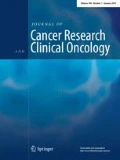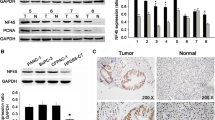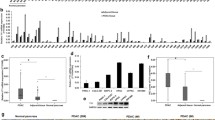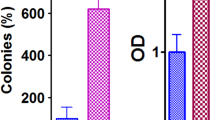Abstract
Purpose
Aberrant tumor cell B7-H1 expression, a member of B7 family that can predominantly stimulate interleukin 10 (IL-10) products, contributed to the tumor immune evasion and tumor progression. This study was designed to investigate the expression of B7-H1 and IL-10 in normal pancreas tissues and pancreatic carcinoma samples, and to evaluate clinical significance of B7-H1 expression in pancreatic carcinoma.
Methods
First, the B7-H1 and IL-10 expression in 40 pancreatic carcinoma samples and 8 healthy pancreas specimens using reverse transcription-PCR (RT-PCR) and western-blotting was detected. Localization of B7-H1 and IL-10 was confirmed by immunohistochemical (IHC) staining. Next, the association between B7-H1 expression and tumor differentiation and tumor stage was analyzed. Finally, the correlation between tumor-associated B7-H1 and IL-10 was evaluated.
Results
Pancreatic carcinoma samples demonstrated the up-regulated expression of B7-H1 and IL-10 at mRNA and protein level compared with normal pancreas tissues. IHC staining revealed that B7-H1 and IL-10 was almost localized in tumor cells. Analysis of relationship between B7-H1 and tumor clinicopathological characteristics showed that B7-H1 expression was significantly associated with poor tumor differentiation (P < 0.01) and advanced tumor stage (P < 0.01). Meanwhile, tumor-associated B7-H1 expression was also correlated with IL-10 products (P < 0.01, R 2 = 0.6985, mRNA level; P < 0.01, R 2 = 0.7236, protein level) in tumor cells.
Conclusions
Our findings for the first time demonstrated up-regulated B7-H1 expression in human pancreatic carcinoma tissues, which might play a role in tumor progression and invasiveness. This expression seemed to be related to the ability of B7-H1 to promoting IL-10 secretion.




Similar content being viewed by others
Abbreviations
- BSA:
-
Bovine serum albumin
- IL-10:
-
Interleukin-10
- IHC:
-
Immunohistochemical
- MDC:
-
Myeloid dendritic cells
- PD-1:
-
Programmed death 1
- RT-PCR:
-
Reverse transcription-PCR
- TNM:
-
Tumor node metastasis
References
Akdis CA, Blaser K (2001) Mechanisms of interleukin-10-mediated immune suppression. Immunology 103:131–148
Bellone G., Turletti A, Artusio E, Mareschi K, Carbone A, Tibaudi D, Robecchi A, Emanuelli G., Rodeck U (1999) Tumor-associated transforming growth factor-ß and interleukin-10 contribute to a systemic Th2 immune phenotype in pancreatic carcinoma patients. Am J Pathol 155:537–547
Carter L, Fouser LA, Jussif J, Fitz L, Deng B, Wood CR, Collins M, Honjo T, Freeman GJ, Carreno BM (2002) PD-1: PD-L inhibitory pathway affects both CD4(+) and CD8(+) T cells and is overcome by IL-2. Eur J Immunol 32:634–643
Curiel TJ, Wei S, Dong H, Alvarez X, Cheng P, Mottram P, Krzysiek R, Knutson KL, Daniel B, Zimmermann MC, David O, Burow M, Gordon A, Dhurandhar N, Myers L, Berggren R, Hemminki A, Alvarez RD, Emilie D, Curiel DT, Chen L, Zou W (2003) Blockade of B7-H1 improves myeloid dendritic cell-mediated antitumor immunity. Nat Med 9:562–567
Dong H, Zhu G., Tamada K, Chen L (1999) B7-H1, a third member of the B7 family, co-stimulates T-cell proliferation and interleukin-10 secretion. Nat Med 5:1365–1369
Dong H, Strome SE, Salomao DR, Tamura H, Hirano F, Flies DB, Roche PC, Lu J, Zhu G, Tamada K, Lennon VA, Celis E, Chen L (2002) Tumor-associated B7-H1 promotes T-cell apoptosis: a potential mechanism of immune evasion. Nat Med 8:793–800
Erdman SE, Rao VP, Poutahidis T, Ihrig MM, Ge Z, Feng Y, Tomczak M, Rogers AB, Horwitz BH, Fox JG (2003) CD4+CD25+ regulatory lymphocytes require interleukin 10 to interrupt colon carcinogenesis in mice. Cancer Res 63:6042–6050
Geng L, Jiang G, Fang Y, Dong S, Xie H, Chen Y, Shen M, Zheng S (2006) B7-H1 expression is up-regulated in peripheral blood CD14+ monocytes of patients with chronic hepatitis B virus infection, which correlates with higher serum IL-10 levels. J Viral Hepat 13:725–733
Iwai Y, Ishida M, Tanaka Y, Okazaki T, Honjo T, Minato N (2002) Involvement of PD-L1 on tumor cells in the escape from host immune system and tumor immunotherapy by PD-L1 blockade. Proc Natl Acad Sci USA 99:12293–12297
Keir ME, Liang SC, Guleria I, Latchman YE, Qipo A, Albacker LA, Koulmanda M, Freeman GJ, Sayegh MH, Sharpe AH (2006) Tissue expression of PD-L1 mediates peripheral T cell tolerance. J Exp Med 203:883–895
Konishi J, Yamazaki K, Azuma M, Kinoshita I, Dosaka-Akita H, Nishimur M (2004) B7-H1 expression on non-small cell lung cancer cells and its relationship with tumor-infiltrating lymphocytes and their PD-1 expression. Clin Cancer Res 10:5094–5100
Moore KW, de Waal Malefyt R, Coffman RL, O’ Garra A (2001) Interleukin-10 and the interleukin-10 receptor. Annu Rev Immunol l19:683–765
Sarkar FH, Banerjee S, Li Y (2006) Pancreatic cancer: pathogenesis, prevention and treatment. Toxicol Appl Pharmacol 11 [Epub ahead of print]
Strome SE, Dong H, Tamura H, Voss SG., Flies DB, Tamada K, Salomao D, Cheville J, Hirano F, Lin W, Kasperbauer JL, Ballman KV, Chen L (2003) B7-H1 blockade augments adoptive T-cell immunotherapy for squamous cell carcinoma. Cancer Res 63:6501–6505
Tamura H, Dong H, Zhu G., Sica GL, Flies DB, Tamada K, Chen L (2001) B7-H1 costimulation preferentially enhances CD28-independent T-helper cell function. Blood 97:1809–1816
Thompson RH, Gillett MD, Cheville JC, Lohse CM, Dong H, Webster WS, Krejci KG, Lobo JR, Sengupta S, Chen L, Zincke H, Blute ML, Strome SE, Leibovich BC, Kwon ED (2004) Costimulatory B7-H1 in renal cell carcinoma patients: indicator of tumor aggressiveness and potential therapeutic target. Proc Natl Acad Sci USA 101:17174–17179
Trabattoni D, Saresella M, Biasin M, Boasso A, Piacentini L, Ferrante P, Dong H, Maserati R, Shearer GM, Chen L, Clerici M (2003) B7-H1 is up-regulated in HIV infection and is a novel surrogate marker of disease progression. Blood 101:2514–2520
Vicari AP, Trinchieri G (2004) Interleukin-10 in viral disease and cancer: exiting the labyrinth? Immunol Rev 202:223–236
Wintterle S, Schreiner B, Mitsdoerffer M, Schneider D, Chen L, Meyermann R, Weller M, Wiendl H (2003) Expression of the b7-related molecule b7-h1 by glioma cells: a potential mechanism of immune paralysis. Cancer Res 63:7462–7467
Zou W (2005) Immunosuppresive networks in the tumor environment and their therapeutic relevance. Nat Rev Cancer 5:262–274
Acknowledgments
This work was supported by grants from the National Key Basic Research Program of China (No.2003CB515501) and Science and Technology Department of Zhejiang Province (No. 2006C33027).
Author information
Authors and Affiliations
Corresponding author
Additional information
Lei Geng and Dongsheng Huang contributed equally to this work.
Junwei Liu and Yigang Qian contributed equally to this work.
Junfang Deng and Donglin Li contributed equally to this work.
Rights and permissions
About this article
Cite this article
Geng, L., Huang, D., Liu, J. et al. B7-H1 up-regulated expression in human pancreatic carcinoma tissue associates with tumor progression. J Cancer Res Clin Oncol 134, 1021–1027 (2008). https://doi.org/10.1007/s00432-008-0364-8
Received:
Accepted:
Published:
Issue Date:
DOI: https://doi.org/10.1007/s00432-008-0364-8




